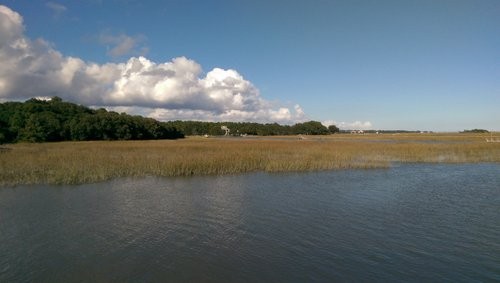This article is more than 5 years old.
Unseasonably warm weather, severely overcrowded rooms, and as many varieties of head cold as there are attendees: the Charleston Conference might not be for everyone. You have to really like acquisitions. Which, fortunately, some of us do.
James O’Donnell, Arizona State’s University Librarian (and a Classicist) gave a keynote-style talk about the need for libraries to embrace the changes that online education and resources have brought. He referred to a “universal collection” in which barriers are broken down between institutions, and called for access to be extended as far as possible. We shouldn’t think of libraries as stable collections or storehouses of information, rather as active and ever-changing “makers of knowledge.” As online education becomes more prevalent (at ASU it is huge), providing online access to our print collections becomes a truly essential function, because so much unique material exists only in that format. Mr. O’Donnell spoke intelligently and convincingly, as classicists tend to do.
Doug Way from Wisconsin (about whom Carol has already written and I will write a bit more later) participated in a panel about industry consolidation in the book-jobber business. Recent acquisitions of YBP by EBSCO and Coutts by ProQuest have sent tremors through the admittedly tremor-prone Technical Services world; there is an increasing sense that we libraries have exactly two choices; and as Mr. Way noted, options equal power, whereas fewer options mean less leverage for the customer. It is quite true, and we have already seen some of the ramifications of consolidation – a term which the companies involved, incidentally, seem to find hurtful. The question of whether book jobbers like YBP and Coutts will continue to play well with a variety of ILS/LSPs, regardless of corporate parentage, is presently unanswerable. As Mr. Way said, we need to see proof of neutrality. Press releases promising continued cooperation are inadequate.
At a “Lively Lunch” session (interpretation: you don’t really get a lunch break), Will Cross and Darby Orcutt from NC State led a very participatory discussion of emerging practices for providing non-academic video content in streaming format. All attendees contributed to the conversation. This was helpful in and of itself, as people in this line of work (i.e. my line of work) often feel as if they are trying to figure these things out on an island. Talk centered around legal questions pertaining to Fair Use, the TEACH Act, and libraries’ good-faith wish to deliver their professors the content they need for instruction. I have repeatedly confronted these issues in my time at ZSR (working with more colleagues than I can name) as we continue to seek solutions for provision of commercial content, especially in cases where the only version is not available to the educational market. To wit: Transparent. But take heart! I happen to know that Molly and Kyle are making important efforts in this area.
And now, about those short-term loans. Carol has already written about Doug Way’s presentation on Wisconsin-Madison’s “systematic abandonment” of this model of ebook acquisition. She also stated, correctly, I think, that we needn’t do the same at this time. On a side note, I found the idea of systematic abandonment oddly compelling: the relinquishment of dying or declining services so as to create opportunities for growth. It made me think of a tree falling in a forest, leaving a hole in the canopy that lets in new light and opens up space for fresh growth. Of course, the tree also crushes innumerable other plants; I haven’t worked out that part of the metaphor yet. At any rate, short-term loans and demand-driven access in general are changing before our eyes, as publishers try via STL price hikes and embargoes to make some money out of this whole ebook thing. Evidence-based acquisition (EBA) seems to be one direction that libraries are going, and I’m sure we’ll have conversations about that in the future. At “Will It Ever Settle Down? The Impact of Rapidly Shifting Ebook Business Models on Libraries and Publishers” David Givens from Loyola-Chicago spoke hilariously about his institution’s initial googly-eyed embrace of DDA and STLs and eventual significant reduction to the program’s breadth due to the aforementioned changes in pricing models. By now they have reduced their DDA pool by two thirds. It’s hard to say where we’ll be in two years, but it’s safe to say that it will be somewhere else; as it always is.
Other programs I attended included such various topics as acquisition of books in “squiggly languages;” Europe’s stricter online privacy laws and Google’s mandate to remove personal information about individuals from its web searches upon request; strategic, as opposed to speculative, collection building; a review of the literature on library users’ satisfaction with ebooks; and an effort by librarians at multiple institutions to create an acquisitions data standard, with emphasis on linked data, for an increasingly interconnected world.
And on Saturday afternoon, after the conference ended, this is where I fished. You can’t see the huge redfish that I caught, because it is still out there.


5 Comments on ‘Charleston 2015’
So thankful there are so many wonderful Technical Services people to keep an eye on these issues for us! And I do miss a beautiful South Carolina salt marsh. Lovely photo!
The “lively Lunch” sounds excellent! It’s good to know that other schools are experiencing this challenge! If anyone can help address this at ZSR, it’s you, Molly and Kyle! Thanks!
I love your metaphor and can’t wait to see how you finish it! I’d be interested in hearing more about evidence based acquisition. And your photo IS lovely.
Like a tree falling in a forest, there is an element of being in the wrong place at the wrong time, (smaller than the tree and on the side that where the vegetation was crushed.) But also the right place at the right time (smaller than the tree but on the side that benefits from the extra sunlight post tree-falling.) Good post. My own metaphor of ebooks and vendors and librarians has been more one of a surfer on a surfboard trying to stay atop a wave. I like your metaphor better.
I’m glad you got to that Lively Lunch session, as I unfortunately had a conflicting appointment. Will is one of my scholcomm colleagues to whom I frequently turn to for advice, including in this current work you, Kyle, and I are undertaking. Looks like you ended your Charleston time in a beautiful spot, warm weather notwithstanding!